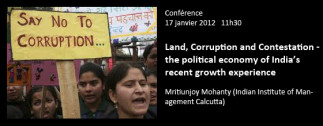Conférencier :
Mritiunjoy Mohanty est professeur à l’Indian Institute of Management Calcutta. Monsieur Mohanty est diplômé du Centre for Economic Studies and Planning, Jawaharlal Nehru University, Delhi. Ses travaux ont notamment été publié dans le Economic and Politcal Weekly.
Résumé :
Between 2003/4 and 2007/8 the Indian economy grew at a historically unprecedented average rate of 8.5%. Even though it slowed down to around 6% as a consequence of the Great Recession, it, like other so-called emerging economies, has since staged a smart recovery and economic growth is currently averaging 7.5%. It would seem therefore that, despite a somewhat fragile current-account balance, India has in place all the macroeconomic ingredients for sustained and rapid economic growth. The flip side of this growth however has been a process of deepening immiserisation and rampant corruption. The immiserisation is on two counts – a neglect of agriculture as a direct consequence of neoliberal reforms, resulting in the increase in the ‘relative surplusness’ of labour in that sector and therefore the persistence of poverty ; second, a classic Harvey-type accumulation by dispossession, led by domestic and foreign capital, of peasants and forest dwellers. But as immiserisation deepens and with few opportunities outside land and forests, so does land hunger, resulting in widespread resistance to dispossession. This resistance of peasants and forest-dwellers to dispossession has forced the issue of land acquisition on to the political agenda. Revelations of elite corruption, particularly the nexus between politicians, bureaucrats and the private corporate sector in the shaping of policy-making and regulation has led to widespread revulsion, particularly among the burgeoning and vocal middle-class. As a result the party-political system faces a serious challenge from a non-political movement against corruption and in favour of greater accountability. It has also caught the Congress-led coalition government, with its rhetoric of inclusive growth, in a cleft stick between neoliberal capitalism on the one hand and mobilisation both from below and by the middle class on the other. Whereas it is too early to say what might be the denouement of these mobilisations, it has brought to the fore contradictions inherent in the growth process, putting in question its sustainability.
Quand ?
Mardi le 17 janvier de 11h30 à 13h00
Où ?
Université de Montréal
Pavillon Lionel-Groulx
3150, rue Jean-Brillant
Salle C-2059
La conférence se déroulera en français et la période de discussion se tiendra en français et en anglais

